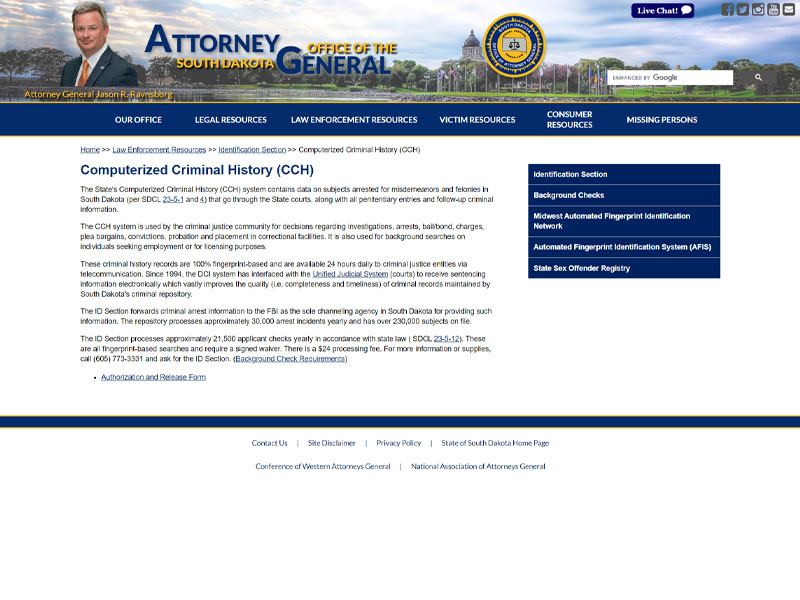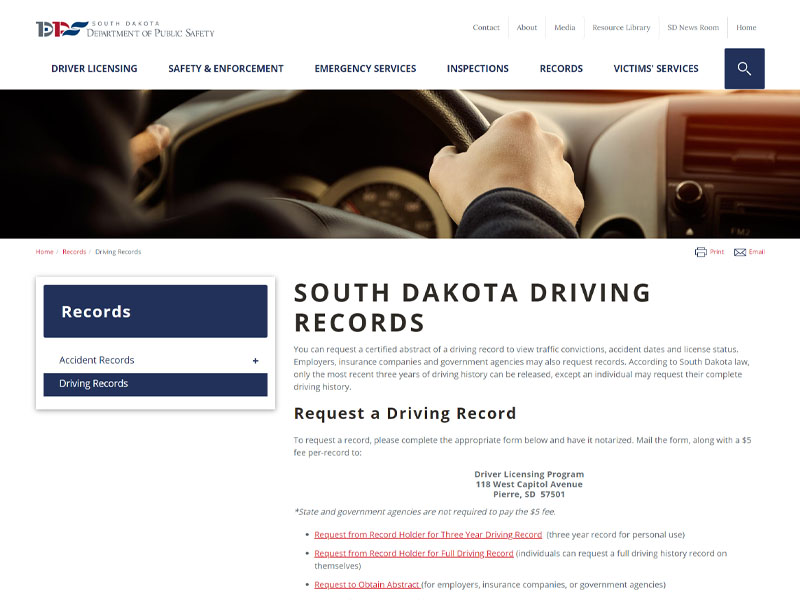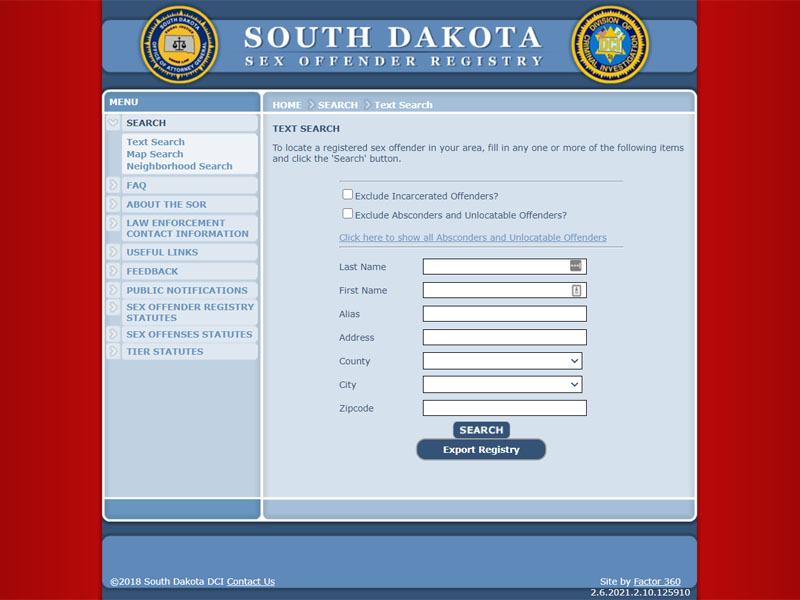Of all the states in the union, South Dakota makes it particularly easy to do a background check on citizens living in this state.
South Dakota records are very well organized, open to anyone (citizen or business in South Dakota or anywhere else in the United States, for that matter), and very easy to search.
On top of that, the people that work in the records departments are generally pretty happy to help individuals and businesses find the information they are having a difficult time accessing.
While you’ll want to use any of the online background check tools available from South Dakota before you reach out directly, just know that if you do decide to go down that direction you’ll get a lot more help (friendly help, too) than you might have expected.
South Dakota Background Check Info You Need to Know
South Dakota has always had a reputation for good record-keeping, great organization, and fast responses when it comes to background checks.
But this reputation improved even more so in 2009.
In 2009, the state legislature passed legislation called the South Dakota Public Records Law that was almost immediately signed into action.
This law codified a lot of the same rules and regulations established by the federal Freedom of Information Act as the “law of the land” when it came to looking for information in the state of South Dakota, too.
It also allowed citizens outside of South Dakota to look up public records, something that they previously didn’t have access to (or at least as much access as they did once this bit of legislation passed).
At the same time, though, the South Dakota Open Records Laws do not allow for public access to the judicial system records. Individuals will only have the opportunity to get executive and legislative branch documentation and records as of early 2021.
On top of that, some information deemed sensitive by the state can be redacted – particularly if that information is found to fall under the category of “invasion of privacy, a threat to public safety, or threat to South Dakota security”.
On those grounds, some background checks can be denied outright or denied partially with the heavy redactions.
Can Anyone Look Up Someone’s Background in South Dakota?
Like we mentioned a second ago, the overwhelming majority of public records in the state of South Dakota are available for anyone and everyone to access upon request.
This includes citizens of South Dakota, business owners in South Dakota, as well as citizens and business owners that live anywhere else in the United States.
Applications for background check information may need to be submitted in writing (depending on the department), though many have modernized and updated their systems to allow for online application processes.
It’s even possible to phone in an application, calling the department that holds the records you are interested in directly and giving them your application information over the phone. That’s one of the fastest ways to get approved if the online application process is not available.
As a general rule of thumb, background checks will only be able to be processed after the following information has been included on your application/request:
- The name of the individual or organization requesting the information
- The contact information for that individual or organization
- The type of information that is being pursued, with as much information and detail as possible
- The specific window of time that this information should be made available
- As well as how to deliver the information, documentation, and records (physically through the mail or digitally via email)
What Type of Info Shows Up on a South Dakota Background Check?
Employers that are looking to run a pre-employment background check are going to want to begin with a criminal record search in the state of Colorado.
This search is going to be conducted through the Division of Criminal Investigation Identification Department, a department that is responsible for maintaining and reporting information contained within the Computerized Criminal History System of South Dakota.
All background checks in this system are fingerprint-based, and that means that they are going to require a signed waiver from the individual whose background is being investigated (as well as a set of fingerprints put on an official fingerprint card).
A free fingerprint kit can be sent to the individual whose background is being investigated by contacting 605-773-3331 and requesting a kit to be mailed to them. Individuals will have to take the fingerprinting card to their local law enforcement office to have the printing done professionally.
After that is taking care of, this is the kind of information that South Dakota criminal records usually include:
- Personally identifying information (name, date of birth, etc.)
- Physical description
- Arrest history
- Case numbers
- Charging details
- Sentencing information
- Release information
- Conviction status
South Dakota court records are also available in most circumstances, though these are some of the hardest to track down in the state even after the 2009 changes were implemented.
This is because these records are “siloed” in each of the individual court systems throughout the state.
We are talking about the Supreme Court, the Circuit Courts, the Small Claims Court, and the problem-solving courts in the state of South Dakota (courts that include drug court, DUI court, mental health court, and veterans treatment court).
Each of these courts needs to be contacted directly and independently, with a clerk of courts at that specific courthouse helping you track down the information and records that you are looking for.
It is possible to request criminal cases stretching back as far as 1989 and civil cases as far back as 2003 – records that have been sealed will not be available during the background check process.
Court case information will include details like:
- Court minutes
- Docket information
- Case file information
- Any orders of the court
- Judgment details
- Witness documentation
- All jury records and files
The Public Action Records Search tool available through the South Dakota Unified Judicial System may be able to expedite a search for these kinds of records, too.
Inmate records in South Dakota are maintained by the South Dakota Department of Corrections.
To find this kind of information, you’ll need to provide inmate name and DOC number details that will have to be input into the database directly.
Information you’ll be able to find searching these records include:
- Name of the inmates and any aliases
- DOC number
- Age, race, and gender information
- Physical description information
- Current or last facility details
- Current status details
- Current parole office details
Finally, if you’d like to find vital records in South Dakota you’ll need to contact the town or city offices where those records will be held directly.
Birth records, marriage records, divorce records, and death records are maintained by the state of South Dakota stretching back as far as 1905.
How Far Back Do Background Checks Reach?
Background checks in South Dakota have no time limit, though as a general rule only the last seven years of criminal history is provided during these kinds of checks.
It is possible, however, for background checks conducted in the state to go back indefinitely. Criminal records are never destroyed, only expunged or sealed (and even then those records are still available to law enforcement agencies and the judiciary).
As highlighted just a moment ago, vital records in South Dakota are maintained going back as early as 1905!
The overwhelming majority of employment background checks, however, are going to involve a snapshot of the last seven years of an individual’s history.
How Long Does It Take to Run a South Dakota Background Check?
South Dakota background checks take (on average) between five and seven business days to successfully complete.
Obviously, some background checks – including those that are a little more in-depth or involve more agencies – are going to take a little longer than that.
It is very rare for these kinds of background checks to take any longer than two weeks or so, though.
Criminal background checks in South Dakota may take even longer, especially if a fingerprint kit needs to be sent out to the individual in question that is having their background investigated.
Oftentimes, individuals applying for jobs that require a background check will actually have already made an appointment to go down to the local police department and have their fingerprints taken for this check.
If that hasn’t happened already, though, it can take two or three weeks for these background checks to be completed.
How Much Do Background Checks in South Dakota Cost?
Criminal background checks in South Dakota are going to cost $26.75 for each background check, without exception.
They also require a signed waiver as the criminal background check system in South Dakota is 100% fingerprint-based.
If these background checks involve the FBI (more detailed background checks will go through this extra step) expect an extra $19.25 to be tacked onto the background check bill.
This brings the total to $46 even.
Court case background checks are going to require a $20 fee before the process can be started if you’re going to be using the Public Action Records Search. This fee is assessed even if no results are returned.
Searches made through the South Dakota Unified Judicial System are going to cost four dollars per name that is being searched and a one-dollar fee per name to access the actual docket of information itself.
Those looking to run South Dakota vital record checks will need to have a Vital Records Check Application filled out, signed, and notarized with a clean and clear copy of their photo ID.
These cost $15 and should be mailed (with many included) to the State Office in Pierre, South Dakota.
Are There Background Checks for Firearms in South Dakota?
South Dakota abides by the same firearm background check laws established by the federal government.
Anyone looking to purchase a firearm in the state of South Dakota from a Federal Firearms Licensed dealer will need to first fill out Form 4473 and then have the information run through the National Instant Background Check Service.
After that, the NICS service does a quick background check at the federal level (using the information provided by the FBI) to determine whether or not an individual looking to purchase a firearm is a “prohibited person”.
If not, the firearm transaction goes through.
If the individual is determined to be a prohibited person at the federal level the transaction is stopped and the individual is not allowed to purchase that firearm at all.
In some circumstances, there is a delay. Some of these delays are cleared up inside of a few minutes, some of them inside of a few hours, and some of them take a couple of days.
After three days, however, the Federal Firearms Licensed dealer is legally able to transfer that firearm to the purchaser regardless of whether or not they have heard back from the NICS service.
As far as firearm licenses or permits are concerned, none of them are required to purchase long guns or handguns in the state of South Dakota. The state is a “shall issue” state, meaning anyone that applies for a concealed carry permit and is not a prohibited person will be granted that permit within five days.
This permit is usually only provided for those that wish to carry out-of-state in any of the states in America that have reciprocity with South Dakota. As of July 1, 2019, South Dakota became a Constitutional Carry/permitless carry state.
What About South Dakota Driving Records?
South Dakota driving records are available through the Department of Public Safety.
Requesting a complete driving record form is generally pretty simple and straightforward, though it does require printing out a specific form, getting it notarized, and then including a five dollar fee before sending it to Driver Licensing Program, 118 West Capitol Avenue, Pierre, SD 57501
Different types of forms are available for those that wish to request a three-year snapshot of a driving record for personal use, full driving history for individuals, full driving history for employers, insurance companies, and government agencies, and CDL Holder three-year driving records.
Abstract driving records that include traffic convictions, accident dates, and current license status can all be found directly through the South Dakota DMV website itself.
Can I Search South Dakota Sex Offender Records?
The South Dakota Department of Corrections maintained a Sex Offender Registry that is available 100% free of charge for any citizen of South Dakota (or any US citizen, for that matter) to search and browse.
All individuals that have been convicted of serious sex crimes are registered within this database, and all offenders need to register within six months of their conviction.
Sex offenders on supervised release also have to update their location and residence address every time that they move, making sure that that information is accurate inside of this database.
All searches are available 100% online, 24/7, and completely free of charge.
How Do I Get Credit History During a Background Check?
When it comes to credit history checks as part of a pre-employment background check, South Dakota really has nothing to do with this kind of information.
No, this information is only going to be accessible through the three major credit bureaus that are responsible for keeping and maintaining this data, to begin with.
Those three organizations are Equifax, Experian, and TransUnion, the same three bureaus that are responsible for reporting credit scores and tracking our credit history.
All information that these agencies provide needs to adhere to the rules and regulations established by the Fair Credit Reporting Agency laws at the federal level.
Individuals will have to provide their written and signed consent for this kind of background check to be conducted in the first place. They must also be notified of how this information was used (if at all) during the hiring process.




